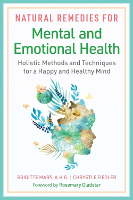
Image by Milan Pinder
Making room for more joy and happiness in your life means learning how to manage uncomfortable emotions like anxiety more effectively. Natural remedies and practices can help you deal with and soothe your anxiety and clear the way for a more peaceful, well-balanced you.
What Is Anxiety?
The word anxiety comes from the Latin angustia, meaning “narrowness, restriction, or difficulty.” It’s an apt description, because when we feel fearful, our world constricts. Anxiety can be a warning of impending pain or potential danger, triggering alertness—a useful quality, as this planet can be a perilous place. It can also be provoked by fear (of the known or unknown) and can occur when we are out of harmony within ourselves or with the people and things around us.
In reality, anxiety is unrelated to any real, imminent danger. It is an overreaction of the autonomic nervous system, where the flight-or-fight mechanism is activated and exaggerated. When this happens the stress hormones adrenaline and cortisol are released to help us deal with danger, real or imagined.
Causes of Anxiety
It’s not unusual to suffer from anxiety and depression. Anxiety can come from heredity, trauma (including while in utero), difficult birth or childhood, blood sugar imbalances, glandular disorders, respiratory disorders, digestive disorders, major stress, physical illness, and medication. These can all contribute to anxiety. Research indicates that a biochemical imbalance in the amygdala (the brain’s alarm center, located in the emotional center of the brain) can cause this psychological imbalance.
Excessive copper in the body (from copper pipes or cookware) can be a contributing factor in anxiety. Yeast overgrowth can contribute to anxiety, and anxiety contributes to yeast overgrowth. In ayurvedic medicine, anxiety is considered an imbalance of vata, the air element.
Anxiety can feel like you’ve had way too much coffee, like a swarm of bees is buzzing around you, or like an electrical charge is running throughout your body. It’s very uncomfortable! Other symptoms can include clammy hands, rapid heartbeat, muscle tension, nausea, stomach distress, and shallow, rapid breathing resulting in excessive carbon dioxide, which can make you feel light-headed, dizzy, numb, tingly, or sweaty; you may experience chest pain.
Chronic anxiety can increase the risk of heart attack, precipitate an asthma attack, worsen diabetes, and weaken immunity, making us more susceptible to cancer as well as colds, flus, and herpes outbreaks.
Different Types of Anxiety
Anxiety manifests in many different ways. If you always feel fearful, no matter what is actually happening, you might have generalized anxiety disorder. Having a panic disorder means you experience sudden attacks of severe anxiety, which are very frightening and can make you feel out of control. The attacks are brief, only lasting a few minutes, but can be misidentified as a heart attack since you can experience heart palpitations, shortness of breath, and dizziness. Once you have an anxiety attack, you may begin to avoid situations that you think provoke them.
Obsessive-compulsive disorder (OCD) is another form of anxiety disorder. If you have OCD, you tend to have obsessive thoughts or actions, like going over your to-do list twenty times, washing your hands repeatedly, or checking and rechecking to make sure a door is locked, in a false belief that it will keep bad things from happening.
Phobias, too, are anxiety disorders, in this case causing fear of subjects ranging from heights to flying to snakes and more.
There are many natural remedies that can help calm and even prevent anxiety. Some of these natural remedies are becoming more well-known but others may be new to you. We encourage you to explore the remedies that most resonate with you.
Nutritional Therapy
Feeding the brain and the central nervous system with the right foods can help soothe anxiety. The best antianxiety diet is one that keeps your blood sugar at a steady level morning, noon, and night, because symptoms may worsen when your blood sugar dips. This means choosing lean proteins, whole grains, veggies, and fruit and nixing refined sugars and starches.
Anxiety is more likely to occur when blood sugar is low. The most important thing is to avoid getting too hungry. You may do best “grazing” all day long, eating four to six small meals and snacks; carry nuts, cheese, crackers sunflower seeds, or pumpkin seeds in your bag each day.
As best you can, avoid coffee, excitotoxins such as MSG (monosodium glutamate), artificial sweeteners, stimulants, asthma medications, decongestants, and antidepressants. All drugs and alcohol can trigger anxiety, rev you up, and put your body into panic-alert overtime.
Also avoid any foods you might be allergic to, as they can cause increased pulse, thus provoking a feeling of anxiety and potentially even triggering a panic attack. If necessary, keep a food diary to determine which foods bother you the most.
Other foods to focus on include those that have high levels of calming calcium, like oatmeal and yogurt. Lettuce also helps calm anxiety. Nutrient-dense, grounding foods such as buckwheat, chia, millet, black quinoa, black rice, black sesame seeds, sea vegetables, sweet potatoes, and winter squash are also helpful.
Good to Know!
Unstable blood sugar levels can lead to depression and anxiety. In fact, a hypoglycemic (low blood sugar) reaction mimics the physiological symptoms of a panic attack. This is why it’s so important to keep your blood sugar on an even keel instead of a sugar-powered roller coaster. Carry a few Brazil nuts with you for a lightweight, yet filling snack.
Mother Nature’s News
A 2011 study published in Brain, Behavior, and Immunity showed that people who took fish oil supplements had a 20 percent reduction in anxiety and a significant reduction in inflammation. If you want to try this supplement as a way to alleviate anxiety, be sure to find a high-quality, pure fish oil supplement to avoid mercury and other toxins.
Fish oil is helpful primarily as a source of omega-3 fatty acids. There are also vegan sources of omega-3s, including blue-green algae, chia seeds, hemp seeds, and walnuts.
Mind-Body Therapies and Practices
Just as we may spend time working on our physique with exercise, there are many practices available that can augment all that we do for a healthier body and mind. Taking time out for self-care and self-love is part of the healing journey. Anything we can do that gets us to slow down, be present, and make wise decisions can help us calm anxiety.
? Take Control When Panic Attacks
? When a panic attack occurs, sit down, keeping your knees uncrossed.
? Breathe slowly.
? Put your hands firmly on the surface in front of you—a table, the arms of your chair, the floor—and say “STOP” aloud.
? Work on keeping your body relaxed and breathing slow. Remember that however panicked you are, this feeling will pass and not harm you.
? Try to focus on something else. Say a comforting prayer or a sacred chant or mantra, or count backward from 100 by threes. Or try focusing on a still object in the room, observing it so closely that you lose yourself in its details. Another technique is to grab an object, such as an orange, and with your hands in front of your chest, switch the orange from hand to hand in a gentle sweeping motion to balance the brain’s hemispheres. Continue the technique of your choice until you feel calm.
? Take up to five deep inhalations from a bottle of lavender essential oil in each nostril.
? Afterward, when you are calm, give the episode a rating of 1 to 10, 10 being extreme panic. Then you can ask yourself what the attack was trying to protect you from. Write about your answers and feelings. Visualize how you want things to go in your life and write about it.
Write It Down
If worry persists, consider taking the last five minutes of every hour to write down what is worrying you in order to identify the problems.
? Setting Action Steps
-
Separate the issues causing you anxiety into categories—for example, home, family, work.
-
Next, ask what you can do about each worry right now.
-
If you can take action on a particular problem, break it down into smaller steps. Write them down as a to-do list or in your day planner.
-
Take action, one step at a time.
Another helpful journaling technique is to ask yourself: “What is the worst that can happen?” Write down your answers. Once you know what that is, chances are you’ll be able to face the possibilities with more sanity.
You can also use your journal to keep track of the factors that might contribute to anxious feelings or panic attacks. Are there any common denominators, such as a food, place, theme, certain person, or situation?
Make a list of the people and places you typically encounter. Ask which of those feel safe and which don’t. Put a mark by all those that feel threatening, and try to limit your exposure to them. Create safe space in your home, in your work space, and with friends and family. See how that makes you feel.
Conscious Media
Anxiety can be driven or exacerbated by media. Where you place your consciousness affects your reality. Most mainstream media is controlled by a few companies who are determined to push their own agenda for power and profits. So, choose what goes into your mind wisely. Overwatching the news, spending too much time and energy on social media, and watching movies and reading books designed to fill us with fear and dread can be very detrimental to our mental and emotional health.
Minimize social media time if it is not serving your highest good. Posts on social media can trigger feelings of anxiety, envy, FOMO (fear of missing out), depression, and even anger. So, turn off notifications and even your phone when possible.
Make it a habit to check in with yourself throughout the day and ask, “Is this book [movie, post, video, etc.] adding to my knowledge, helping me to be a better person, helping me feel more positive, or is it a distraction or desctructive?
Practical Tips for Managing Anxiety
Anxiety is not always easy to manage, but there are some simple, practical steps you can take to keep your emotions from growing beyond your control.
Take action. There’s a saying: The antidote to anxiety is action. In other words, when you’re feeling worried or anxious about a particular issue, focus on doing something about it. If you can’t figure out what to do, brainstorm solutions with a trusted friend.
Unburden. Share your problems with a trusted friend or family member. Tell them what is troubling you. Clear your mind and heart.
Stay busy. Being busy crowds out worry. Active people don’t have time to worry!
Prepare. When attending situations that are likely to cause anxiety, go with a friend, avoid sugar and alcohol beforehand, and be sure to take your calming supplements, like your B vitamins, before leaving.
Set boundaries. If you must worry about things, designate one hour of the day to this activity. When that hour is up, you’re done!
Accept. If you are feeling anxious but can’t take action in that moment, try the Serenity Prayer: God [or whatever force you hold sacred] grant me the serenity to accept the things I cannot change, the courage to change the things I can, and the wisdom to know the difference.
Copyright 2024. All Rights Reserved.
Adapted with permission of the publisher,
Healing Arts Press, an imprint of Inner Traditions Intl.
Article Source:
BOOK: Natural Remedies for Mental and Emotional Health
Natural Remedies for Mental and Emotional Health: Holistic Methods and Techniques for a Happy and Healthy Mind
by Brigitte Mars A.H.G.
 Mental health and emotional well-being are just as important as physical health. And like physical health, there are many simple ways to improve and support mental wellness with the healing power of herbs and other holistic remedies and practices.
Mental health and emotional well-being are just as important as physical health. And like physical health, there are many simple ways to improve and support mental wellness with the healing power of herbs and other holistic remedies and practices.
In this comprehensive guide to natural methods to maintain a healthy mind, herbalist Brigitte Mars and natural health expert Chrystle Fiedler explore many common mental health concerns and stress-related issues—such as anxiety, depression, panic attacks, anger, insomnia, brain fog, and trauma—and share remedies and practices to address and heal their root causes. The authors also explore holistic practices and treatments for moving through grief, breaking free from addiction, working with ADHD and epilepsy, supporting chronic conditions like bipolar disorder, PTSD, and Parkinson’s disease, and recovering from traumatic brain injury (TBI) and stroke.
Presenting a wealth of holistic self-care therapies for mental well-being, emotional balance, and neurological health, this guide enables each of us to heal the mind and nurture the soul, two essential keys to a happy, joyful life.
For more info and/or to order this book, click here. Also available as a Kindle edition.
 About the Author
About the Author
Brigitte Mars is an herbalist and nutritional consultant with almost fifty years of experience. She teaches herbal medicine at Naropa University and the School of Health Mastery in Iceland and has also taught at Omega Institute, Esalen, Kripalu, and the Mayo Clinic.
A founding member of the American Herbalists Guild, she is the author of many books and DVDs including The Natural First Aid Handbook, The Sexual Herbal, Healing Herbal Teas, and Rawsome!
Visit her website at: BrigitteMars.com

























